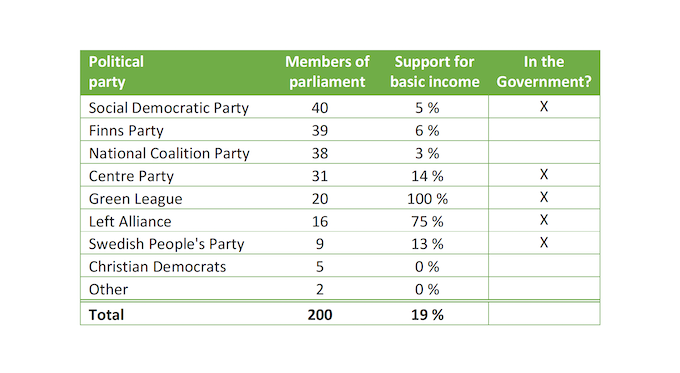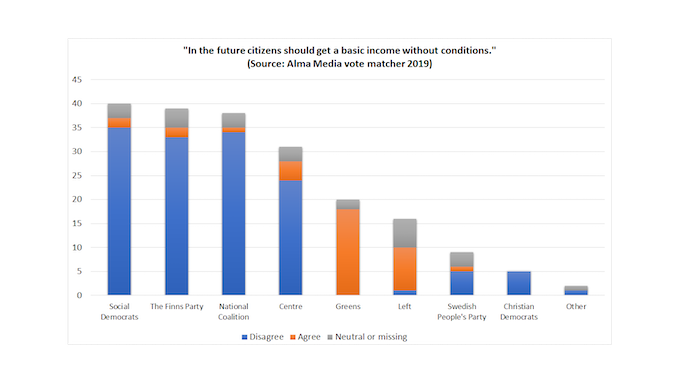The April 2019 elections in Finland saw a shift away from the status quo and the resulting government now counts with the Green League as a coalition partner. In the upcoming parliamentary term, the future of Finnish social security is set to be a major topic. The basic income trials carried out in 2017-2018 and the advanced national debate on the topic set Finland apart as a key context to look to when following basic income developments. As discussions advance, they both become more nuanced yet also remain stuck on the same intractable points, an indication of the profound questions which the discussion on basic income brings to the fore.
In recent decades, Finnish governments have been built around the three largest parties: the Social Democrats, the centre-right National Coalition, and the Centre Party. While coalitions varied, two of these forces tended to lead at any one time. But the rise of the Finns Party has changed all that. In April elections, the right-wing populist force came in at second place, as in 2015, but this time trailing the Social Democrats by just a single seat. Their success makes building coalitions tricky, as the Finns Party is seen as unfit for cooperation, and strengthens smaller parties such as the Greens and the Left Alliance.
Fiscal sustainability and the welfare state were central issues in this year’s April election as parties debated whether more generous welfare benefits, including a basic income, were affordable. Investigations into neglect in privately run care homes sparked debate on the former government’s failed healthcare reform, which – had it passed – would have increased outsourcing even further.
The youth-led climate strikes, seen in Finland as across Europe, pushed forward discussions about more ambitious climate policies, forest usage, and transport. The Greens and the Finns Party were the benefactors of a polarised debate that pitted a greened welfare state against the status quo – even as many traditional parties defended personal cars, meat consumption, and other arguably unsustainable aspects of lifestyles today.
After the elections, Social Democrat Antti Rinne formed a ‘popular front’ government and became prime minister. As well as the centre-left, the coalition includes the agrarian Centre Party, the Green League, the Left Alliance, and the Swedish People’s Party of Finland. The new government programme is quite progressive: on feminist and human rights issues, it promises to end the sterilisation of transgender people before legal gender recognition and increase number of refugees that Finland receives. Many parts of the government programme are conditional and will go ahead depending on the economic situation, as well as further study.
Among the parties now in government, the Greens, the Left Alliance, and the Centre Party all campaigned for some form of basic income. A rough calculation based on official party policy puts 67 parliamentarians from a majority of 116 in favour of basic income, but the apparent majority of basic income-supporting government parties is less clear cut than it first seems. The Greens and the Left Alliance both updated their basic income policies before the elections. The Greens advocate a 600-euro monthly basic income for all citizens. The Left Alliance wants to see it higher at 800 euro. But the unconditionality of basic income has divided the Centre Party, regardless of its official position.
The undecided centre
The Centre Party’s field has historically supported the idea of basic income. According to pre-election reports, a quarter of Centre Party candidates agreed that “in the future, citizens should get a basic income without conditions”. By contrast, only 18 per cent of Social Democrats, 13 per cent of the Finns Party, and 6 per cent of Coalition Party candidates were in favour. Meanwhile, support was near universal among the candidates of the Greens (97 per cent) and the Left Alliance (96 per cent).
However, support for basic income is weaker in the elected parliament than it was among candidates. Only the Greens and Left Alliance are staunch supporters. In the “pro-basic income” Centre Party only four MPs (14 per cent) back a basic income. Across parties, just one in five MPs support a basic income at some point in the future.


The Centre Party’s most notable mention of a “citizen’s wage” was in a 1998 policy paper on reforming work. At its 2018 party congress, its members declared that the party would aim to implement a basic income in the next parliamentary term (i.e. the one that has just begun) and called for the basic income trial that ran from 2017–2018 to go on. Despite this, party leader and prime minister going into the elections Juha Sipilä opposed this policy on the basis that the party should not support an unconditional welfare model, a basic tenet of universal basic income. Sipilä’s government never got round to deciding on a second basic income trial.
The Centre Party suffered a major hit at the election, losing 18 seats and its top spot in Parliament, a loss which may be attributed to unpopular austerity policies. The government’s “activation model”, which demands that unemployed people take part in employment promotion courses or part-time work over a 65-day period, was criticised by the parties on the Left and despised by the Finnish public. If the activity requirement is not met, recipients face a 4.65 per cent cut to their unemployment benefit for the next period. Polling ahead of the activation model’s introduction showed that 56 per cent of Finns were against the model, with only 37 per cent supporting it. A citizens’ initiative against it collected over 140 000 signatures and its abolition became a major promise among left-leaning parties in the elections.
While the Centre Party was the key player behind the original basic income trial of 2017–2018, activation represented a step away from universal basic income. The party’s own social security proposals were published in February 2019 and experts soon pointed out that it was far from a basic income: their proposals demand that healthy recipients be available for work or face sanctions and, contrary to universal basic income models, require people to apply to start receiving the payments. More than basic income, the Centre Party’s plans resembled the universal credit proposals spearheaded by the Social Democrats and the conservative National Coalition.
Findings from the first basic income trial
The basic income trial that Finland ran from 2017 to 2018 hoped to find a new way to encourage people to work (see this article on the experiment). Initial signs have been described as “disappointing” by social policy expert Heikki Hiilamo, and the first year’s results show no significant effects on employment, despite the fact that the basic income recipients could retain the 560-euro payment even if they started work. Results from the second year are yet to come and will be hard to judge because recipients of basic income were not affected by the activation reform that came into force in January 2018 (and that is now expected to be abolished by January 2020).
Reading the first-round data on employment is tricky too. Basic income recipients were not made to take part in normal employment programmes with the threat of sanctions, but the control group was, so it’s possible that the lack of active labour market policies balanced out the changes in monetary incentives.
The issue is further complicated by the fact that many basic income recipients attended these programmes nonetheless: 65 per cent of people receiving the basic income had an employment plan in 2017, compared with 70 per cent of the control group. This may be explained by other monetary incentives such as additional child benefits being payable on top of unemployment benefit, or because basic income recipients simply kept in touch with the employment services. Contrary to popular belief, some receiving the basic income may have still found the services beneficial and were happy to continue receiving them.
Looking beyond employment, a phone survey conducted in the last months of 2018 found that in comparison to the control group basic income recipients were healthier, less stressed, and considered their outlooks in life to be better. Data on wellbeing is limited, however, as the survey was introduced as an afterthought and had a poor response rate, and its findings potentially biased due to people more happy with basic income being more eager to answer. More robust support for basic income’s effects on wellbeing might still be found at a later date using health services data.
More trials to come
The strong Nordic welfare state depends on as many people working, and thus paying in, as possible. As Nordic societies’ age and birth rates fall, the ratio of older people needing services and benefits to younger, working-age contributors is on the rise, putting the system’s future at risk. Even the parties in the new, more left-wing government have committed to increasing the employment rate to 75 per cent.
Politicians on the right fear that basic income or any other step towards more unconditional welfare benefits would lower employment. Coalition Party’s MP Juhana Vartiainen, formerly a prominent economist and a Social Democrat, argues that the higher employment rates of other Nordic countries can be explained by their stricter workfare and activation policies.
As all changes to welfare systems are complex, many find it reasonable to continue with experimentation and smaller reforms. For example, the Greens also plan the merger of basic welfare benefits and a smaller 300-euro monthly basic income as steps towards their basic income model, a proposal that could gain support from other parties. 300 euros may seem like a small sum, but basic income models in Finland are “partial” in the sense that they leave other forms of support such as housing benefit in place. Incremental change makes sense because a more extensive universal basic income might not be universally supported by the public. Researcher Ville-Veikko Pulkka has found that support for basic income is sensitive to how it is framed, the amount, and the changes which accompany its introduction.
The new government will fund a 20-million-euro experiment on a negative income tax as part of its programme. Professor Olli Kangas, who oversaw the first basic income experiment, is a long-term advocate of this proposal. A negative income tax means that individuals earning less than a set amount receive a cash transfer from government and thus pay “negative tax”. The benefit would be designed so that it would always pay to work more. This experiment can be seen as a second basic income experiment as the two models have the same effects on income distribution. A separate experiment will analyse the benefits, services, and information provided to people in unemployment services and will hopefully resolve the unanswered questions from the first trial.
The coalition is also looking into an earned income tax credit, a sister model of basic income similar to a scheme in the United States. In the US, families can receive a transfer based on a percentage of their income, again acting as a form of negative income tax. The difference is that the scheme is mainly aimed at families whose members are in work. The Finnish Social Democrats have proposed a form of earned income tax credit to support low earners who pay low rates of tax and therefore stand little to gain from tax cuts. While a true negative income tax would be unconditional (like universal basic income), earned income tax credit is conditional. Rather than changing the existing welfare system, it would supplement the current system by decreasing in-work poverty and encouraging work.
Consensus on universal credit
There are multiple different welfare models under discussion in Finnish politics, but universal credit merging existing benefits is the most prevalent. Such diverse parties as the Social Democrats, the National Coalition Party, and the Christian Democrats all support this model. Even the OECD has argued for universal credit rather than basic income in Finland – albeit based on problematic calculations that compared apples to oranges.
The words “universal credit” might send shivers down people’s spines due to the experience of the United Kingdom. In a 2018 lecture in Finland, British social policy professor Jane Millar noted that many issues with universal credit in the UK were down to poor implementation and simultaneous austerity measures, such as the “bedroom tax” on social housing tenants “over-occupying” houses, a benefit cap for people out of work, and limits on child tax credits. But the idea of merging different “legacy benefits” into universal credit is the main factor driving the discussion in Finland.
The discussion in Finland has moved forward from basic income as a stand-alone measure.
The most recent phase of the universal credit roll-out in the UK has led to severe public scrutiny, as some people who switched to the programme earlier than necessary will lose thousands of pounds of income a year. Universal credit in the UK has been designed to support work and severe sanctions can be put on people who fail to follow their personal “claimant commitments”. Instead of increasing unconditionality, the programme has broadened conditionality even to the working poor who, despite being already in work, still need to meet certain conditions or face sanctions.
Politicians in Finland aim to simplify the social security system. In this respect universal credit is a major next step, on which there is broad political consensus. Depending on the form of universal credit, it could be either more or less conditional than the current system. A single taper rate would mean that the benefit decreases in a linear manner to ease people’s transition from benefits to work. Merging the benefits could also mean less red tape when transferring from one status to another, freeing up resources for tailored services.
For proponents of basic income, simplifying the system is a potential step in the right direction: universal credit would be a benefit that acts more like basic income (more universal and work always pays) and needs fewer adjustments to be transformed into an actual basic income or negative income tax.
For basic income’s opponents, simplifying the system addresses the grievances of the current system without changing its core. They would still aim to keep the costs of the system in check by pushing people towards employment with activation and sanctions. For them, universal credit encourages work and reduces administrative costs.
Basic income and the welfare state
The Nordic model is used by politicians around the world such as Bernie Sanders as an example of a successful welfare state. But what is understood by the Nordic model differs significantly and often neglects the large role that active labour market policies play. Today the famous Nordic model is being pulled in different directions, between a right that doubts its sustainability, a radical left pushing for a full basic income, and social democracy hoping to preserve the status quo.
Many Finnish parties proposed their own social security models in the last Parliament. Most include a simpler basic-level benefit, with varying conditions attached, and there is consensus on using Finland’s new income register to better manage the transition between work and benefits. The future of Finnish social security will be a major topic in the next Parliament, to which all parties as well as experts will contribute.
The discussion in Finland has moved forward from basic income as a stand-alone measure. Any proposed basic income model has to be embedded in the wider and more complex systems of a welfare state. At least two discussions are increasingly important: first, on fair and just principles (regarding, for example, level of market-dependence, degree of activation, and the sufficiency and cost of benefits) and, second, on how basic income can fit into a wider system where some other benefits still exist and services still help people find work and manage the other challenges of modern life.
As it stands now, support is lacking in the Finnish Parliament for a more radical leap towards a basic income. Other benefits already guarantee a means-tested minimum income, and pushing for unconditionality in the form of basic income seems as hard as ever.
















